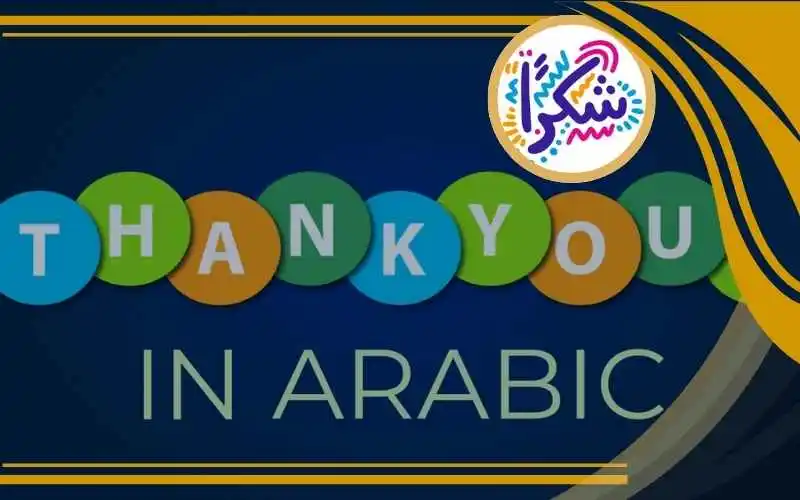To say thank you in Arabic, you would say “شكراً” (shukran). This is the most common and polite way to express gratitude.
When expressing gratitude in Arabic, it’s often important to add a respectful and warm tone, especially when you’re addressing someone in a formal or sincere manner.
How To Say Thank You in Arabic (Modern Standard Arabic)
In Modern Standard Arabic, “Thank you” is said as:
“شكرًا” (Shukran)
This is the most common and widely used expression to show gratitude. If you’d like to say it in a more formal or heartfelt way, you could extend it to:
- “شكرًا جزيلًا” (Shukran Jazeelan) – This means “Thank you very much” or “Many thanks.”
- “أشكرك” (Ashkuruka) – This means “I thank you” (if addressing a male), and “أشكركِ” (Ashkuruki) would be used for addressing a female.
- “أنا ممتن لك” (Ana Mumtanun Lak) – “I am grateful to you.”
- “لا أعرف كيف أشكرك” (La A’aref Kayfa Ashkuruka) – “I don’t know how to thank you.”
These variations vary based on the degree of formality and the emotional tone you intend to express.
Expressions of Gratitude in Quranic Arabic
Here are some expressions of gratitude in Quranic Arabic, with their English translations. They are based on verses and themes from the Quran:
1. الْحَمْدُ لِلَّهِ رَبِّ الْعَالَمِينَ
Translation: All praise is due to Allah, Lord of the worlds. (Quran 1:2)
This is one of the most famous expressions of gratitude, found in the opening verse of the Quran, Al-Fatiha. It expresses gratitude to Allah for His Lordship over the entire creation.
-
شَكَرَ اللَّهُ لَكُمْ
Translation: May Allah reward you with gratitude.
This is often said in gratitude to someone for their help or kindness, invoking Allah’s reward for their good actions.
-
لِتُكَبِّرُوا اللَّهَ عَلَى مَا هَدَاكُمْ
Translation: So that you may glorify Allah for what He has guided you to. (Quran 2:185)
This verse from Surah Al-Baqarah emphasizes the gratitude for Allah’s guidance during the blessed month of Ramadan.
Expressing Thanks in Arabic Culture
The most common phrase for expressing gratitude is “Shukran” (شكراً), which directly translates to “Thank you.” This word is widely used across the Arab world in daily interactions, and it reflects appreciation in both formal and informal contexts.
In more formal or respectful situations, especially when addressing elders or those in a position of authority, a person might say “Shukran Jazeelan” (شكراً جزيلاً), meaning “Thank you very much” or “Many thanks.” The word “Jazeelan” (جزيلاً) adds a layer of emphasis, making the gratitude sound deeper and more heartfelt.
In situations where someone has done something especially generous or thoughtful, one might say “Jazak Allahu Khairan” (جزاك الله خيراً). This phrase is often used in the context of expressing gratitude for an act of kindness and literally means “May Allah reward you with good.” It reflects a deep appreciation and often carries spiritual connotations, wishing for divine blessings in return for the person’s kindness.
Shukran Used in a Sentence
“Shukran” is the Arabic word for “thank you,” commonly used in many Arabic-speaking countries to express gratitude. It is a simple yet powerful way to show appreciation in both formal and informal settings. For instance, if someone offers you a cup of tea or assists you with directions, saying “Shukran” acknowledges their kindness and shows respect. This word is not just a formality; it reflects the deep cultural value of showing thanks and gratitude. In Arabic culture, expressing appreciation is an essential part of building positive relationships and showing humility.
Conclusions
In conclusion, expressing gratitude is a universal practice that bridges cultures, and learning how to say thank you in Arabic can enhance your communication and connections with Arabic-speaking people. Whether you choose to say “Shukran” for a simple thank you, or “Jazak Allahu Khairan” to convey a deeper appreciation, mastering these expressions can open doors to more meaningful interactions. By understanding the cultural significance behind these phrases, you can show respect and kindness in a way that resonates with those you encounter. Thank you for visiting our site, and we hope this guide has helped you feel more confident in expressing gratitude in Arabic!


